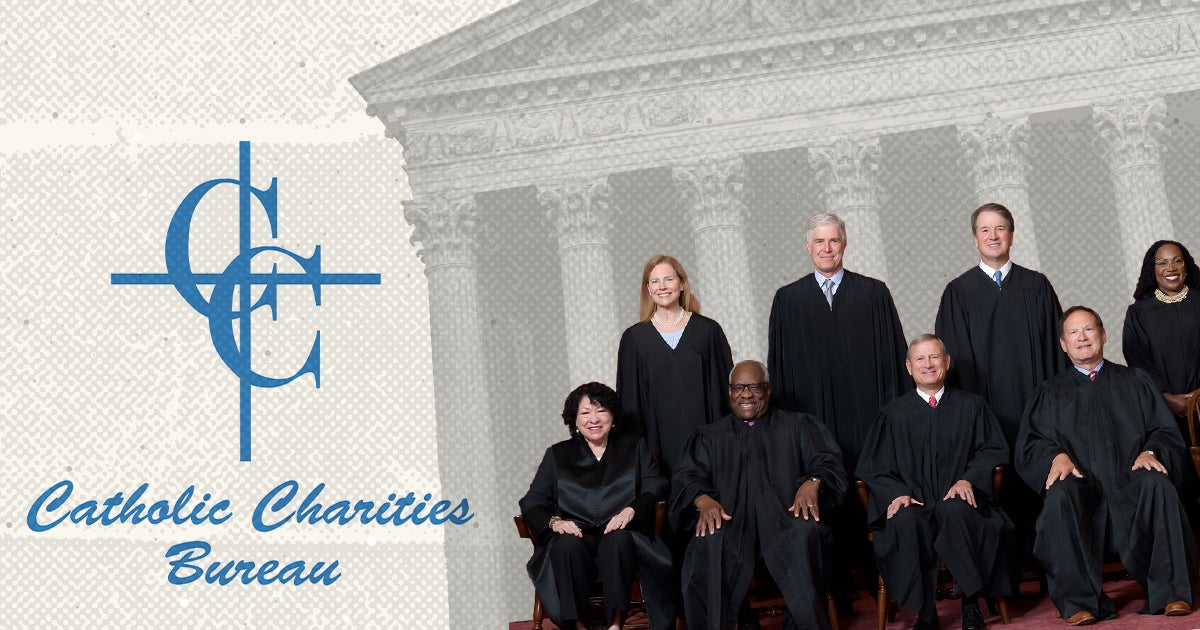
by Jorge Gomez • 4 minutes
The U.S. Supreme Court recently heard arguments in Catholic Charities Bureau v. Wisconsin Labor & Industry Review Commission. Catholic Charities Bureau (CCB) is being forced to pay taxes because, according to the state, it is not sufficiently religious. The Wisconsin Supreme Court issued a troubling opinion that stripped the ministry of its classification as a religious organization.
First Liberty filed an amicus brief supporting CCB and explaining why the Supreme Court should reverse the state court’s ruling.
“In its opinion, the Wisconsin Supreme Court set forth an erroneous understanding of religious exercise that limited religious activities to those involving religious worship, education, or the active sharing of a religious faith,” our brief notes. “This caricature of religion improperly limits what qualifies as religious exercise in a manner that threatens religious charitable ministries across the country.”
Following the argument, a vast number of news outlets (including The New York Times, The Washington Post, Reuters, CNN, NBC News and USA Today) reported that the Court seemed poised to rule in favor of the religious charity. A decision is expected by late June.
Since 1917, CCB has operated as part of a Diocese in northern Wisconsin, providing a wide range of services to the disabled, the elderly and the poor. Its mission is to serve people in need, regardless of their religious beliefs.
Wisconsin’s unemployment insurance program provides financial assistance to those who have lost their jobs through no fault of their own. Under state law, certain nonprofit organizations in Wisconsin can opt out of the program, including those operated primarily for religious purposes.
The Wisconsin Supreme Court ruled that CCB could not receive a religious exemption from the state’s unemployment compensation program. The state court concluded that CCB’s service to the poor and needy was not “typical” activity. It also held that the charity was not “operated primarily for religious purposes” as required for the tax exemption.
Our friends at Becket are representing CCB. Their attorney told the Supreme Court that the case is not complicated.
“The Wisconsin Supreme Court got it wrong when it interpreted a state-law religious exemption to favor what it called ‘typical’ religious activity and when it held that helping the poor can’t be religious, because secular people help the poor, too,” he said. “To resolve this case, this Court need do nothing more than say that the Constitution doesn’t allow courts to do that.”
A majority of the Court, including some of the liberal justices, appeared deeply skeptical of the state court decision.
“It just seems as though Wisconsin says we’re going to set up this system that is operating in a discriminatory fashion,” Justice Ketanji Brown Jackson said.
“There are lots of hard questions in this area,” Justice Elena Kagan said. “But I thought it was pretty fundamental that we don’t treat some religions better than other religions and we certainly don’t do it based on the content of the religious doctrine that those religions preach.”
“Isn’t it a fundamental premise of our First Amendment that the state shouldn’t be picking and choosing between religions?” asked Justice Neil Gorsuch. “Doesn’t it entangle the state tremendously when it has to go into a soup kitchen—send an inspector in—to see how much prayer is going on?”
The outcome of this case could set an important precedent that protects longstanding tax exemptions for faith-based nonprofits. This will impact ministries and charitable organizations across the country that make an incredible, life-changing impact in the lives of millions of people.
Multiple Religious Freedom Cases Pending at the Supreme Court
First Liberty currently is waiting to hear whether the Court will accept two major cases we submitted, and it’s possible we’ll hear back on one of them soon.
The Supreme Court could strengthen parental rights and religious liberty through our Blake Warner case. And our case involving evangelist Gabriel Olivier presents an opportunity for the Court to protect religious expression, free speech and Americans’ right to seek relief in court.
The Supreme Court will hear arguments in two more religious freedom cases in late April.
First Liberty filed a friend-of-the-court brief in one involving more than 300 religious parents in Montgomery County, Maryland. They argue they should be allowed to opt their children out of school reading materials promoting controversial ideology in violation of their religious beliefs.
We also filed a brief supporting St. Isidore of Seville Catholic Virtual School, a faith-based charter school that’s being excluded from receiving publicly available benefits simply because of its religious character.
2025 could be another landmark year for religious freedom at the nation’s highest court. Each of these cases present a tremendous opportunity to set a precedent that would protect religious freedom for millions of Americans.